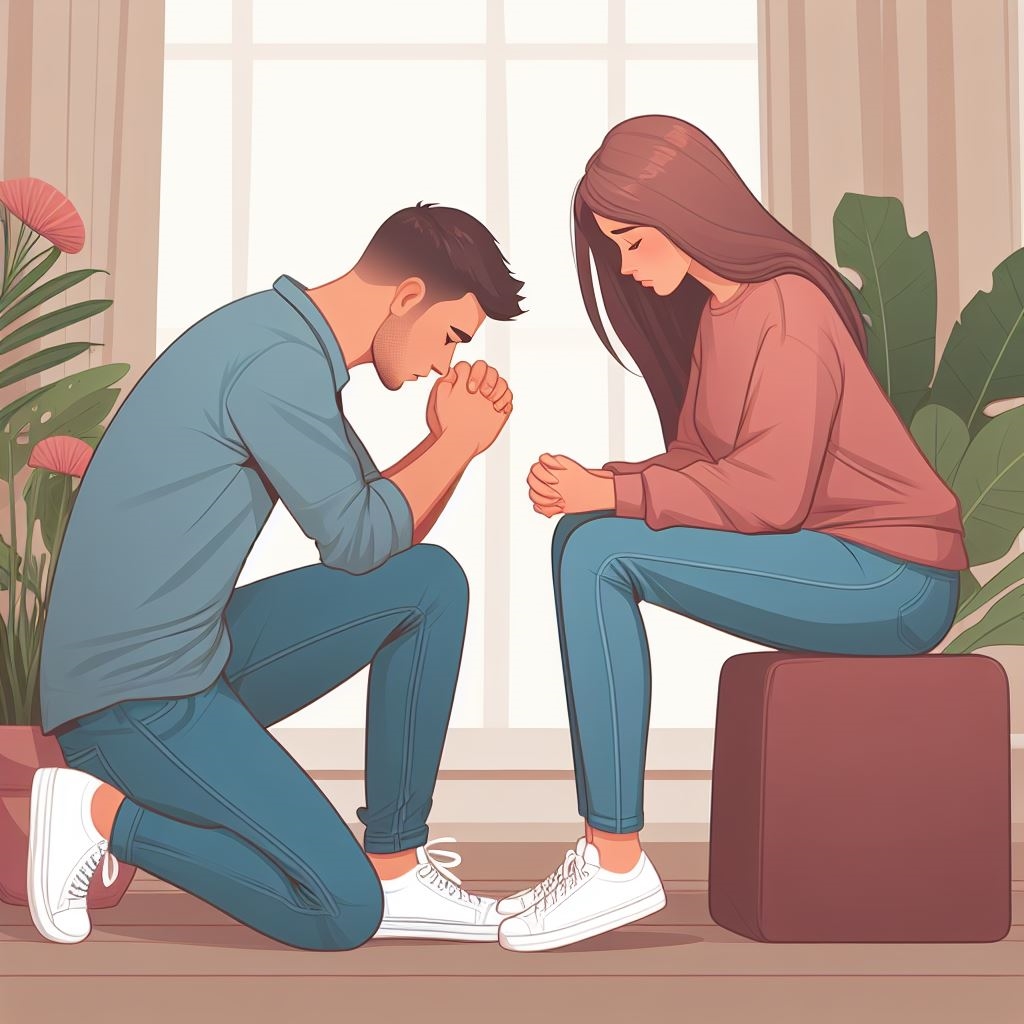We’ve all been there. You’ve had a disagreement with your girlfriend, and now you’re left with the daunting task of making amends. It’s not always easy to say “I’m sorry,” but it’s a crucial step in maintaining a healthy relationship.
Apologizing is more than just uttering the words; it’s about acknowledging your mistakes, showing empathy, and making a commitment to do better. It’s a powerful tool that can mend trust, reduce conflict, and strengthen your bond.
However, not all apologies are created equal. There are common mistakes that people often make when trying to apologize. Some might rush through the apology, not giving it the time and sincerity it deserves. Others might use the apology as an opportunity to justify their actions, shifting the blame rather than taking responsibility. And then there are those who expect immediate forgiveness, forgetting that an apology is just the first step in the healing process.
In this article, we’ll guide you through the process of how to apologize to your girlfriend effectively, avoiding these common pitfalls. We’ll provide you with a step-by-step guide to mending fences and rebuilding trust in your relationship.
So, let’s dive in and learn how to turn a moment of conflict into an opportunity for growth and deeper understanding.
Understanding the Need to Apologize
In any relationship, acknowledging our mistakes is not a sign of weakness, but rather a testament to our maturity and respect for our partner. It’s about owning up to our actions, showing that we value the relationship more than our ego. When we admit our wrongs, we not only develop greater mutual respect but also create a more comfortable and authentic relationship.
A sincere apology goes beyond just saying “I’m sorry.” It’s about demonstrating that we understand our partner’s pain and that their pain hurts us too. It’s about showing empathy, remorse, and a commitment to learn from our mistakes. This process can be challenging, as it requires us to confront our ego and self-image. However, it’s a crucial step in rebuilding trust, which is the currency of love.
Trust, once broken, can be hard to restore. It’s not something that can be regained overnight or with a simple apology. It requires consistent effort, patience, and a genuine demonstration of change. A sincere apology can help in this process by opening up communication, making people feel comfortable with each other again, and conveying the value we place on the relationship. It allows us to discuss what the “rules” should be in the future, helping to protect the relationship from further hurt.
Steps to Apologize Effectively
Navigating the delicate process of apologizing to your girlfriend requires more than just a simple “I’m sorry.” Here’s a step-by-step guide to ensure your apology is not only heard but felt, paving the way for genuine reconciliation.
1. Acknowledge Her Feelings
Begin by recognizing and validating her feelings. It’s important to show that you understand the impact of your actions on her emotions. A statement like “I see that you’re hurt by what I did, and I truly regret causing you pain” can demonstrate your empathy and awareness.
2. Apologize Sincerely for Your Actions
Next, offer a heartfelt apology for the specific actions that led to the situation. Avoid generic apologies; instead, be clear about what you’re sorry for. This might sound like, “I apologize for raising my voice during our argument. It was wrong, and I regret disrespecting you in that way”.
3. Explain Your Perspective Without Justifying Your Actions
While it’s important to share your perspective, be careful not to justify your behavior. This step is about providing context, not excuses. You might say, “I want you to know that I was stressed from work, but I realize that doesn’t excuse my behavior towards you”.
4. Apologize Again to Reinforce Your Sincerity
To close, reiterate your apology to reinforce your sincerity. This could be as simple as saying, “Once again, I’m truly sorry for what I did and the hurt it caused you”.
5. Giving Her an Apology Gift
While actions and words are essential in an apology, a thoughtful gift can serve as a tangible representation of your remorse and commitment to making things right.
By carefully selecting an apology gift, you can demonstrate your sincerity and enhance the heartfelt apology you’ve already given. It’s a delicate balance, but when done right, it can help heal the pain and move your relationship forward in a positive direction.
Remember, a genuine apology is not just about the words you say but also about the actions you take afterward to show that you are committed to change and making things right.
What Not to Do When Apologizing
While it’s important to know how to apologize, it’s equally crucial to understand what not to do when apologizing. Here are some common mistakes people often make:
Using “But” in Apologies
When you use “but” in an apology, it can come across as if you’re trying to justify your actions or shift the blame, which can make your apology seem insincere. For instance, saying “I’m sorry, but I was having a bad day” suggests that you’re not fully taking responsibility for your actions and that the same harm could happen again.
Shifting Blame
Shifting blame is when you attempt to apologize but say it was someone or something else’s fault that you acted the way you did. This approach is problematic because it shows a lack of responsibility for your actions. An apology should be about acknowledging what you have done and asking for forgiveness, not about blaming others or circumstances.
Making It About Yourself
When apologizing, it’s important to focus on the feelings and experiences of the person you’ve hurt, not on your own feelings or intentions. Explaining yourself too much or making excuses can come across as self-centered and insincere. The focus should be on expressing genuine remorse and understanding the impact of your actions on the other person.
Expecting Immediate Forgiveness
Apologizing is a step towards mending a relationship, but it doesn’t guarantee immediate forgiveness. It’s important to understand that the person you’re apologizing to may need time to process your apology and heal from the hurt.
Offering Conditional Apologies
A sincere apology should not include caveats or qualifiers. Conditional apologies, such as “I’m sorry if I offended you,” can come across as insincere and manipulative. They may seem to shift the blame or question the validity of the other person’s feelings.
By avoiding these common mistakes, you can offer a sincere and effective apology that acknowledges your mistakes, shows your remorse, and respects the feelings of the person you’ve hurt.
How to Make Up for Your Mistakes
After delivering a heartfelt apology, the next crucial step is to demonstrate your sincerity and commitment to change. Here are ways to make up for your mistakes and show your girlfriend that you’re serious about improving your relationship:
1. Making Amends
Making amends means taking action to correct your wrongs. This could involve:
- Restoring what was lost: If your actions led to a loss, find ways to restore it. For example, if a fight resulted in a broken item, offer to repair or replace it.
- Going the extra mile: Show that you’re willing to put in extra effort to make things right. This could be through gestures that address the consequences of your actions.
2. Changing Behavior
True apologies are underscored by behavioral change. Commit to not repeating the mistake by:
- Identifying triggers: Understand what led to the mistake and work on managing those triggers.
- Seeking personal growth: Consider counseling or self-help resources to address underlying issues.
- Setting goals: Create specific, measurable goals for change and share them with your girlfriend to show your commitment.
Understanding your girlfriend’s unique ways of expressing affection can help improve your relationship. For instance, some girlfriends may express their affection through playful biting, which can be seen as a playful and affectionate act, akin to animal behaviors.
If you’re curious about this behavior, you can read more in our article on why does my girlfriend bite me.
3. Consistent Effort Over Time
Consistency is key in rebuilding trust. Demonstrate your commitment by:
- Being reliable: Follow through on promises and be dependable in both small and significant matters.
- Showing patience: Understand that trust rebuilds over time and be patient with the process.
4. Open Communication
Maintain open lines of communication by:
- Listening actively: Show that you’re willing to listen to her feelings and concerns without becoming defensive.
- Expressing yourself: Share your feelings and the steps you’re taking to change in a clear and honest manner.
5. Rebuilding Intimacy
Work on reconnecting emotionally and physically by:
- Spending quality time together: Engage in activities that both of you enjoy and that can help you bond.
- Being affectionate: Show physical affection, as appropriate, to reinforce your emotional connection.
By taking these steps, you can show your girlfriend that your apology is not just words but is backed by meaningful actions. This approach can help heal the wounds of the past and lay a stronger foundation for your future together.
If you’re looking for ways to revive the love and connection in your relationship, check out our article on how to make her fall in love with you again.
Conclusion
Remember, a sincere apology is not just about the words you say but also about the actions you take afterward to show that you are committed to change and making things right.
We hope that these tips will help you to sincerely apologize and improve your relationships. Remember, everyone makes mistakes, but it’s how we learn from them and make amends that truly defines our character and the quality of our relationships.
We’d love to hear from you. Have you used any of these tips in your relationship? Do you have other strategies for apologizing effectively? Please share your experiences or thoughts in the comments section below. Your insights could help others navigate their own relationship challenges. Let’s learn and grow together in our journey towards healthier and happier relationships.







